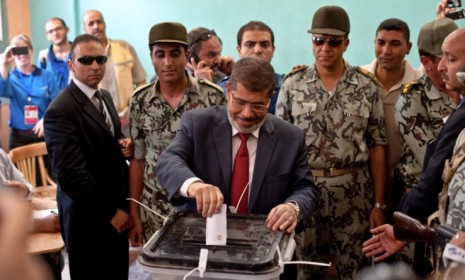Egypt's presidential election: A farce?
Egyptians cast their ballots, and the Muslim Brotherhood's Mohamed Morsi claims victory. But Egypt's powerful military may not give up power that easily

A free daily email with the biggest news stories of the day – and the best features from TheWeek.com
You are now subscribed
Your newsletter sign-up was successful
The Egyptian media has declared Mohamed Morsi of the Muslim Brotherhood the winner of the first competitive presidential election in the country's history. Meanwhile, supporters of Ahmed Shafiq, the last prime minister of the deposed-and-jailed Hosni Mubarak, insisted that their candidate had, in fact, won the run-off. (Official results aren't expected until Thursday.) But either way, the new president might enjoy little power. In the days leading up to the historic vote, a military-friendly court dissolved the recently elected parliament, and the army granted itself sweeping powers over legislation and the drafting of a new constitution. (The military still vows to hand over power to the new president at the end of June.) Was the presidential election a big step forward, or just a cruel joke on the Egyptian people?
This military takeover makes a mockery of the Arab Spring: The revolutionaries of Tahrir Square must be devastated, says Samia Nakhoul at Reuters. They put their lives on the line, and they wound up with "a toothless president, a dissolved parliament, and an ascendant military in a country without a constitution." This isn't "what most Egyptians had in mind when they poured onto the streets to drive out Mubarak." Egypt's democracy isn't dead, but it's back to square one.
"Egypt's chapter of Arab Spring ends not as scripted"
The Week
Escape your echo chamber. Get the facts behind the news, plus analysis from multiple perspectives.

Sign up for The Week's Free Newsletters
From our morning news briefing to a weekly Good News Newsletter, get the best of The Week delivered directly to your inbox.
From our morning news briefing to a weekly Good News Newsletter, get the best of The Week delivered directly to your inbox.
Things could be worse: It's tempting to dismiss this as a disaster, says Paul Mirengoff at Power Line. But the truth is that the Muslim Brotherhood "has less underlying respect for democracy than the military." The Brotherhood wants to use the ballot box to establish Islamist rule — and the military appears to be trying to "balance the aspirations of the Arab Spring and the imperative of not seeing the country fly out of control and into radical hands."
"The Egyptian military steps in, probably for the better"
Egypt's future is still up in the air: Muslim Brotherhood supporters are celebrating in the streets, says Yolande Knell at BBC News, but "this was not a clear victory" for them, or for anybody. With the role of the presidency yet to be decided, and the military now claiming the right to spell it out, it's unclear how much it matters who gets the job. Maybe this was where the Arab Spring was destined to lead, to "a power struggle between the Brotherhood and the military."
"Egypt's army vows to hand power to elected president"
A free daily email with the biggest news stories of the day – and the best features from TheWeek.com